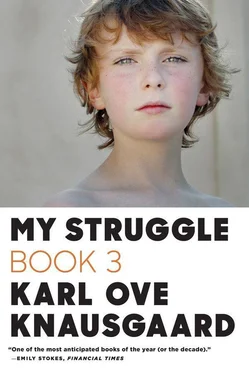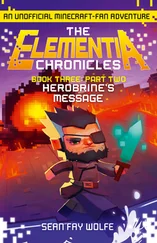“Look,” Yngve said, going over to the Elvis poster I had on the wall over the desk. “Can you guess what’s on the back?”
Bård shook his head.
Yngve loosened the drawing pins, took the poster down, and turned it around.
“Look,” he said. “Johnny Rotten! And he hangs it up with Elvis on the front!”
Both of them laughed.
“Can I buy it off you?” Bård said.
I shook my head.
“It’s mine.”
“But you’ve got it up the wrong way round!” Bård said, laughing again.
“I haven’t,” I said. “That is Elvis, you know!”
“Elvis is the past!” Bård said.
“No, he isn’t. Not Elvis Costello,” Yngve said.
“That’s true,” Bård said.
After they had gone I looked at the two pictures for a while. The one called Johnny Rotten was ugly. Elvis was good-looking. Why should I swap the ugly one for the good-looking one?
Outdoors, we did what we always do every spring: cut branches off the birch trees, tie bottles onto the remaining stumps, collect them the next day, full of light-colored, viscous sap, and drink it. We cut branches off the willow trees and made flutes from the bark. We picked large bunches of white wood anemones and gave them to our mothers. Well, we were too big for the latter really, but it was a gesture, it was us being good, then one morning, when we had only three hours, I dragged Geir with me into the forest, I knew a place where there were so many anemones that from a distance it looked like snow on the ground. Not without some self-torment, though, for flowers were living beings, picking them was killing them, but the cause was good, with their help I could spread happiness. The light fell in shafts through the branches, the bog was a luminous green, and we each picked an enormous bunch, which we ran home with.
When I arrived Dad was at home. He was in the laundry room at the bottom of the house. He turned to me, anger in every movement.
“I picked you some flowers,” I said.
He reached out with his hand, took them, and threw them in the large sink.
“Little girls pick flowers,” he said.
He was right. And he was probably ashamed of me. Once some of his colleagues had come home and they had seen me on the stairs, with my blond hair quite long, because it was winter, and I was wearing red long johns.
“What a nice girl you’ve got,” one of them said.
“It’s a boy,” Dad answered. He had smiled, but I knew him well enough to know the comment had not gladdened his heart.
There was my interest in clothes, my crying if I didn’t get the shoes I wanted, my crying if it was too cold when we were in the boat on the sea, indeed my crying if he raised his voice in situations when it would have been absolutely normal to raise your voice. Was it so strange he thought: what kind of son have I got here?
I was a mama’s boy, he was constantly telling me. I was, too. I longed for her. And no one was happier than I when she moved back for good at the end of the month.
When summer was over and I was about to start the fifth class it was Dad’s turn. He was going all the way to Bergen, to stay at something called the Fantoft Student Town, to major in Nordic literature and become a senior teacher.
“I’m afraid I won’t be able to come home every weekend,” he said during dinner just before leaving. “Perhaps no more than once a month.”
“That’s a shame,” I said.
I went into the drive to see him off. He put his suitcases in the trunk, and then he got in on the passenger side because Mom was driving him to the airport.
It was one of the strangest sights I had seen.
Dad didn’t look right in a VW Beetle, he didn’t. And if he was going to sit in one, it definitely shouldn’t be as a passenger, it verged on the grotesque, especially when Mom got in beside him and started the engine, turned her head, and reversed.
Dad wasn’t a passenger; that much was obvious.
I waved, Dad raised a hand, and they were gone.
What should I do now?
Go into the workshop room, hammer and saw, chop and cut for all I was worth?
Go into the kitchen and make waffles? Fry an egg? Brew up some tea?
Sit with my feet on the table?
No, I knew what.
Go into Yngve’s room, take out one of his records, and put it on full volume.
I chose Play by Magazine.
Turned up the volume almost full blast, opened the door, and went into the living room.
The bass was making the walls vibrate. Music was belting out of the room. I closed my eyes and I swayed back and forth to the rhythm. After doing that for a while I went into the kitchen, took the bar of cooking chocolate, and ate it. The music was booming out around me, but I wasn’t inside it, it was more like part of the house, the dining-room table, or the pictures on the wall. Then I started swaying back and forth again and it was as though I were devouring the music and had it inside me. Especially when I closed my eyes.
Someone downstairs was calling me.
I opened my eyes and gasped.
Had they forgotten something and come back?
I dashed into the bedroom and turned the volume right down.
“What are you doing?” Yngve called from downstairs.
Oh. What a relief.
“Nothing,” I said. “I borrowed one of your records.”
He came up the stairs. Followed by another boy. I hadn’t seen him before. Perhaps someone from volleyball?
“Have you gone completely nuts?” Yngve said. “You can burst the speakers. They’re probably ruined now. You damned idiot!”
“I didn’t know,” I said. “Sorry. Really sorry.”
The other boy smiled.
“This is Trond,” Yngve said. “And this is my stupid little brother.”
“Hi, little brother,” Trond said.
“Hi,” I said.
Yngve went into his room, turned up the volume, and placed his head against the speakers.
“You haven’t burst them, fortunately,” he said, straightening up. “You were lucky. You’d have bought me some new ones otherwise. I would have personally made sure you did.”
He looked at me.
“Have they been gone long?”
I shrugged.
“Half an hour,” I said.
Yngve closed his bedroom door, and I hung around in the living room for a while until I spotted Marianne and Solveig outside. They were pushing a stroller. I went out and ran after them.
“Why don’t we walk together?” I said.
“All right,” they said. “Where are you going?”
“Up.”
“Who are you going to see?”
I shrugged.
“Whose baby is that?”
“The Leonardsens’.”
“How much are you getting?”
“Five kroner.”
“Are you saving up for something?”
“Nothing special. A jacket maybe.”
“I’m going to buy a new jacket, too,” I said. “A black Matinique. Have you seen it?”
“No.”
“The sleeves are long and they’re made of a different material from the rest. Sort of wavy. And it’s got a little flap down the middle covering the zipper. What kind of jacket are you going to get?”
Marianne shrugged.
“A coat, I was thinking.”
“A coat? A light color?”
“Maybe. Quite short.”
“You’re the only boy who talks about clothes,” Solveig said.
“I know,” I said. And it was something I had discovered recently. It was so difficult to talk to girls. Once you had taken their hats or shouted a few bad words after them that was where it usually ended. Well, you could talk to them about homework. But nothing else. Then I suddenly realized. Clothes, that was what they were interested in. All you had to do was chat away.
As we got closer to B-Max, I said bye and ran down the slope to the play area, which was deserted, then up the grass slope to the old car wreck, which was deserted, then over to the soccer field, which was deserted, and over the fence to Prestbakmo’s and the front of the house, where I rang the bell. But Geir was having dinner, and afterward he was going up to Vemund’s.
Читать дальше












